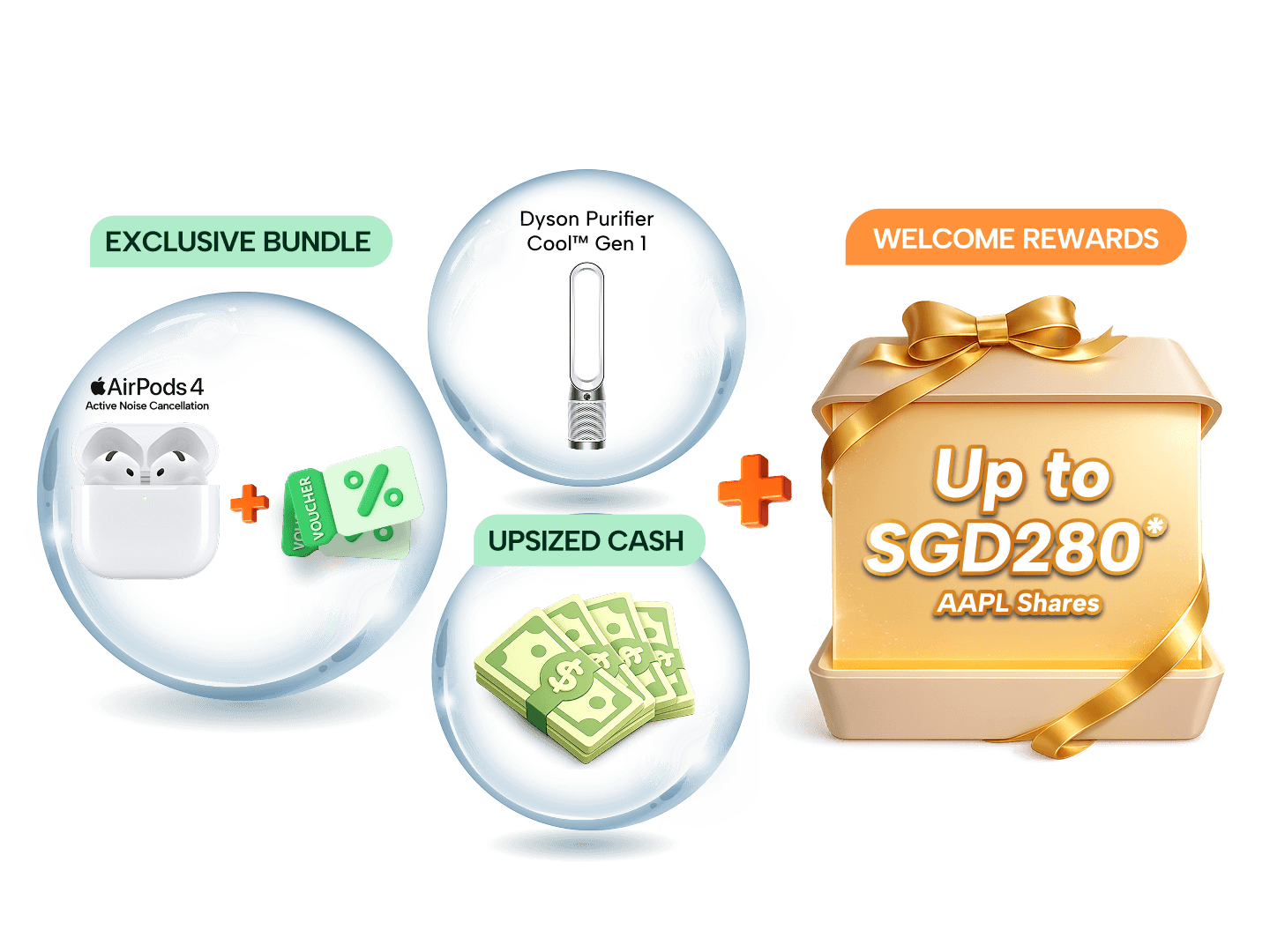What are Exchange-Traded Funds (ETFs)? A Comprehensive Guide for Beginners
Updated: 22 Oct 2025

Exchange-traded funds (ETFs) have rapidly transformed the investment landscape, offering a versatile and accessible gateway for both seasoned investors and those just starting their financial journey. In this comprehensive guide, we'll delve deep into the world of ETFs, exploring their mechanics, diverse categories, associated costs, and how they compare to other investment vehicles like mutual funds and individual stocks.
ETF meaning and definition
An ETF, or exchange-traded fund, is essentially a basket of investments bundled into a single, tradable security. This basket can encompass a variety of assets, including stocks, bonds, commodities, and even currencies. Think of an ETF as a one-stop shop for instant diversification, allowing you to gain exposure to a wide range of assets without having to purchase each individually.
ETFs are listed on stock exchanges, such as the Singapore Exchange (SGX), and trade throughout the day, much like individual stocks. This intraday trading capability, coupled with their typically lower expense ratios compared to traditional mutual funds, has fueled their widespread popularity among investors.
However, it's important to remember that ETFs are not a universal solution. Like any investment, they come with their own set of considerations. Factors such as expense ratios, liquidity (how easily you can buy or sell the ETF), and how well an ETF aligns with your overall investment strategy and risk tolerance should be carefully evaluated before making any investment decisions.
How do ETFs work?
ETFs operate on a simple yet powerful mechanism:
-
Fund creation: An ETF provider, typically a financial institution, carefully selects a collection of assets to create a fund. This fund is then assigned a unique ticker symbol, making it easily identifiable on the stock exchange.
-
Investor participation: Investors like yourself can purchase shares of this ETF through brokerage accounts, similar to how you would buy shares of an individual company.
-
Exchange trading: Once listed on a stock exchange, ETFs are actively traded throughout the day. Their prices fluctuate based on market supply and demand, just like individual stocks.
It's crucial to understand that owning shares of an ETF doesn't grant you direct ownership of the underlying assets within the fund. However, if the ETF includes dividend-paying stocks or bonds, you may be entitled to receive those dividends. Additionally, keep in mind that the market price of an ETF might slightly differ from the net asset value (NAV) of its underlying assets due to factors like market sentiment, trading activity, and fund expenses.
>> Ready to go? Learn more about investing in ETFs
Key takeaways
-
An ETF, or exchange-traded fund, is like a basket of investments, holding assets such as stocks, bonds, and more.
-
ETFs often have lower fees than other types of funds, making them a cost-effective investment option.
-
With ETFs, you can instantly diversify your portfolio across various asset classes and sectors, reducing risk.
SingSaver Exclusive Offer
Compare top brokerages on SingSaver, apply in minutes, and earn rewards, including up to S$500 cash, premium products like Apple AirPods 4 or Dyson devices worth around S$600, or exclusive provider gifts worth over S$13,000. Valid till 1 March 2026. T&Cs apply.
The different types of ETFs
ETFs can be broadly categorised by the types of assets they hold, their investment strategies, and their geographical focus. This allows investors to precisely target their investment objectives, whether it's tracking a broad market index, focusing on a specific sector, or gaining exposure to alternative asset classes.
>> Check out the best ETFs in Singapore
Stock ETFs
Stock ETFs, also known as equity ETFs, are designed to track the performance of a specific stock index or a basket of stocks. For example, the SPDR Straits Times Index (STI) ETF aims to replicate the performance of the STI, which comprises the top 30 companies listed on the Singapore Exchange (SGX). Stock ETFs offer a straightforward way to gain diversified exposure to the equity market, allowing investors to participate in the potential growth of a basket of stocks without having to pick and choose individual companies. They are a popular choice for investors seeking long-term growth and capital appreciation.
Examples of stock ETFs in Singapore:
-
SPDR STI ETF: Tracks the Straits Times Index.
-
Nikko AM Singapore STI ETF: Also tracks the Straits Times Index.
-
iShares MSCI World ETF: Tracks a broad global equity index.
>> Read more about investing in stocks
Commodity ETFs
For investors seeking to diversify beyond traditional stocks and bonds, commodity ETFs offer exposure to raw materials such as gold, silver, oil, and agricultural products. These ETFs can be a valuable tool for hedging against inflation, as commodity prices often rise during inflationary periods. They can also provide diversification benefits, as commodity prices may sometimes move independently of stock and bond markets.
Examples of commodity ETFs:
-
SPDR Gold Shares ETF: Tracks the price of gold.
-
iShares Silver Trust: Tracks the price of silver.
-
Invesco DB Commodity Index Tracking Fund: Tracks a broad basket of commodities.
>> Read more about investing in gold
Exchange-Traded Notes (ETNs)
While ETNs may sound similar to ETFs, they have a key distinction. Unlike ETFs, which directly own the underlying assets they track, ETNs are debt securities issued by a financial institution. These notes promise to track the performance of an underlying index or asset, but they do not own those assets. This introduces a level of credit risk associated with the issuer of the ETN. If the issuer were to default, investors could face losses. ETNs are often used to track commodities, currencies, and more complex strategies.
Examples of ETNs:
-
iPath Series B Bloomberg Coffee Subindex Total Return ETN: Tracks the performance of coffee futures contracts.
-
UBS ETRACS CMCI Food Total Return ETN: Tracks a broad basket of food commodities.
>> Read more about futures trading
Bond ETFs
Bond ETFs provide access to a diversified portfolio of bonds, offering regular income through interest payments. These ETFs can be an attractive option for investors seeking a steady income stream with lower volatility compared to stock ETFs. Bond ETFs can track various types of bonds, including government bonds, corporate bonds, and high-yield bonds. They are a useful tool for managing interest rate risk and diversifying a portfolio's fixed-income component.
Examples of bond ETFs in Singapore:
-
ABF Singapore Bond Index Fund: Tracks the performance of Singapore government bonds.
-
Nikko AM SGD Investment Grade Corporate Bond ETF: Invests in investment-grade corporate bonds denominated in Singapore dollars.
-
iShares Core U.S. Aggregate Bond ETF: Tracks a broad U.S. bond market index.
>> Read more about Singapore Savings Bonds (SSBs)
Country-Specific ETFs
For investors looking to target specific countries or regions, country-specific ETFs offer a convenient way to gain exposure to those markets. For example, the SPDR STI ETF allows investors to focus on the Singaporean stock market, while the iShares MSCI China ETF provides exposure to the Chinese market. Country-specific ETFs can be useful for diversifying internationally and capitalising on the growth potential of specific regions.
Examples of Country-Specific ETFs:
-
SPDR STI ETF: Tracks the Singapore stock market.
-
iShares MSCI China ETF: Tracks the Chinese stock market.
-
iShares MSCI India ETF: Tracks the Indian stock market.
>> Read more about SPDR STI ETF vs. Nikko AM STI ETF
Sector-specific ETFs
Sector-specific ETFs cater to investors interested in particular industries, such as technology, healthcare, real estate, or consumer goods. These ETFs provide a way to gain concentrated exposure to a specific sector of the economy. This can be beneficial if you have a strong conviction about the growth prospects of a particular industry. However, sector-specific ETFs can also be more volatile than broader market ETFs, as they are more susceptible to the ups and downs of a single sector.
Examples of sector-specific ETFs:
-
Technology Select Sector SPDR Fund: Tracks the technology sector of the U.S. stock market.
-
Health Care Select Sector SPDR Fund: Tracks the healthcare sector of the U.S. stock market.
-
Real Estate Select Sector SPDR Fund: Tracks the real estate sector of the U.S. stock market.
>> Read more about technology ETFs and how to invest in the AI boom
Crypto ETFs
Crypto ETFs offer a regulated and accessible way to gain exposure to the dynamic world of cryptocurrencies. These ETFs track the performance of digital assets like Bitcoin, Ethereum, and others, allowing investors to participate in this emerging asset class without the complexities of directly holding and managing cryptocurrencies. They provide a convenient option for diversifying into crypto, offering exposure to its potential growth while mitigating some of the risks associated with direct ownership.
Examples of crypto ETFs:
-
Spot Bitcoin ETFs: Directly track the price of Bitcoin (e.g., ProShares Bitcoin Strategy ETF (BITO)).
-
Crypto Futures ETFs: Invest in Bitcoin futures contracts (e.g., VanEck Bitcoin Strategy ETF (XBTF)).
-
Crypto-Related Company ETFs: Hold stocks of companies involved in the crypto ecosystem.
>> Read more about the best cryptocurrency exchanges in Singapore
Leveraged ETFs
Leveraged ETFs are designed to amplify the returns of an underlying index, typically by two or three times. For instance, a 3x leveraged ETF tracking the STI would aim to deliver three times the daily return of the STI. While this can magnify gains in a rising market, it's crucial to remember that losses are also amplified in a falling market. Due to their higher risk profile, leveraged ETFs are subject to restrictions in Singapore, requiring investors to acknowledge risk disclosures before trading. These ETFs are generally more suitable for short-term trading strategies and experienced investors who understand the risks involved.
*Important note on leveraged ETFs in Singapore:
The Monetary Authority of Singapore (MAS) has implemented regulations to protect retail investors from the risks associated with leveraged ETFs. These regulations include:
-
Risk dsclosures: Brokers are required to provide clear risk disclosures to investors before they can trade leveraged ETFs.
-
Suitability assessments: Some brokers may conduct suitability assessments to determine if leveraged ETFs are appropriate for an investor's risk profile and investment objectives.
Leveraged ETFs can be complex instruments, and it's crucial to thoroughly understand their mechanics and risks before investing.
>> More: How investors can think about high-risk investments
Best-performing ETFs by category
The world of ETFs presents numerous avenues for investment, and to guide you through the options, we've highlighted some best-performing ETFs across key categories:
SingSaver x Webull Exclusive Offer
Open a Webull account and fund a minimum of SGD3,000 to receive S$120 Cash. Fund SGD10,000 to get S$260 cash, or a S$50 eCapitaVoucher + AirPods 4 or 17k Max Miles by Heymax (worth S$306). Or, top up as low as S$50 to get a Dyson Purifier Cool™ TP10. Valid till 1 March 2026. T&Cs apply.
How much do ETFs cost in Singapore? Understanding fees & expenses
When considering investing in ETFs, it's crucial to have a clear understanding of the associated costs:
ETF pices on SGX
The prices of ETFs listed on the Singapore Exchange (SGX) can vary significantly, ranging from a few dollars per share to hundreds of dollars. This wide range accommodates investors with different budgets and investment goals. You can find ETFs that align with your investment capacity, whether you're starting with a small amount or making a substantial investment.
Expense ratios
Expense ratios represent the annual fees charged by ETF providers to cover the costs of managing and operating the fund. These costs include administrative expenses, management fees, and other operational overheads. Expense ratios are expressed as a percentage of the fund's assets. For example, an expense ratio of 0.50% means that for every S$1,000 invested, S$5 will be charged as expenses annually.
It's essential to compare expense ratios across different ETFs, as even seemingly small differences can significantly impact your returns over the long term. Lower expense ratios translate to more of your money staying invested and working for you.
Example:
-
SPDR STI ETF: Expense ratio of approximately 0.30% per annum.
-
Nikko AM Singapore STI ETF: Expense ratio of approximately 0.18% per annum.
In this example, the Nikko AM ETF has a lower expense ratio, which means lower costs for investors.
Trading costs
Beyond expense ratios, there are also trading costs to consider:
-
Brokerage commissions: Most online brokers in Singapore charge a commission fee for each trade you execute. These fees can vary depending on the broker and the size of your trade. Some brokers offer tiered commissions, where higher trade values incur lower percentage fees.
-
Bid-ask spreads: The bid-ask spread is the difference between the highest price a buyer is willing to pay for an ETF (bid price) and the lowest price a seller is willing to accept (ask price). This spread represents a cost for investors, as you'll typically buy at the ask price and sell at the bid price.
-
Foreign exchange conversion fees: If you're investing in ETFs listed on overseas exchanges, such as U.S.-listed ETFs, you'll incur foreign exchange conversion fees when converting Singapore dollars to the foreign currency and vice versa. These fees can vary depending on your broker and the prevailing exchange rates.
Tax considerations
Singapore has a favourable tax environment for investors, with no capital gains tax imposed on profits from selling ETFs. However, if you invest in U.S.-listed ETFs, dividends earned from those ETFs will be subject to a 30% withholding tax by the U.S. government. This tax is deducted at source, meaning you'll receive the dividend payment net of the withholding tax.
Choosing the right ETF for your portfolio in Singapore
With a plethora of ETFs available, selecting the right ones for your portfolio requires careful consideration:
-
Cost differences: As mentioned earlier, expense ratios can significantly impact your long-term returns. When comparing ETFs, prioritise those with lower expense ratios, as this translates to lower costs and potentially higher net returns over time.
-
Passive vs. active: Most ETFs in Singapore are passively managed, meaning they aim to track the performance of a specific index or benchmark. These ETFs typically have lower expense ratios than actively managed ETFs. Actively managed ETFs, on the other hand, involve a fund manager making investment decisions to try and outperform the benchmark. While active management has the potential for higher returns, it also comes with higher expense ratios and no guarantee of outperformance.
-
Avoid high-risk ETFs: Be cautious of ETFs with low liquidity or high fees, as these can eat into your returns and make it more challenging to buy or sell the ETF at favourable prices. Low liquidity means there are fewer buyers and sellers in the market, which can lead to wider bid-ask spreads and potentially higher trading costs.
-
Brokerage fees: Factor in brokerage commissions when comparing the cost of trading ETFs across different brokers. Some brokers offer lower commission fees or even commission-free trading for certain ETFs, which can help reduce your overall investment costs.
>> Want to get started? Check out the best brokers in Singapore for trading ETFs
⚡ SingSaver x Longbridge Flash Deal ⚡
Get S$160 Upsized Cash via PayNow, S$180 Upsized Grab Voucher, Apple AirPods Gen 4 (worth S$199), or 10,000 Upsized Max Miles by HeyMax (worth S$180) when you apply and get approved for a Longbridge SG account, fund a min. of S$2,000 and maintain the assets for 30 days from the day after meeting the deposit criteria. Offer is stackable with Longbridge welcome promo. Valid until 1 March 2026. T&Cs apply.
ETF creation and redemption in Singapore
The creation and redemption of ETF shares involve a mechanism that helps ensure the ETF's price closely tracks the value of its underlying assets. This process is typically handled by institutional investors known as Authorised Participants (APs). APs have the ability to create new ETF shares by delivering a basket of assets that mirrors the ETF's holdings, or they can redeem ETF shares by exchanging them for the underlying assets.
In Singapore, retail investors generally don't participate directly in the creation and redemption process. Instead, they buy and sell ETF shares on the open market through brokerage accounts. The APs' activities help maintain the ETF's liquidity and ensure its price stays aligned with its net asset value (NAV).
Do ETFs pay dividends?
ETFs may pay dividends if their underlying assets, such as stocks or real estate investment trusts (REITs), also distribute dividends. In Singapore, you can find dividend-focused ETFs that specifically target dividend-paying companies. These ETFs can be a good option for investors seeking regular income from their investments
It's important to distinguish between two types of dividend-paying ETFs:
-
Distribution ETFs: These ETFs distribute the dividends they receive from their underlying assets directly to investors, typically on a quarterly or semi-annual basis.
-
Accumulation ETFs: These ETFs reinvest the dividends they receive back into the fund, increasing the number of shares held by the ETF. This can lead to long-term growth in the value of your investment.
The choice between distribution and accumulation ETFs depends on your individual investment goals and preferences. If you're seeking regular income, distribution ETFs might be more suitable. If you prefer to reinvest your dividends for long-term growth, accumulation ETFs could be a better option.
>> Check out our dividend investing guide
Buying and selling ETFs: What Singapore investors should know
ETFs offer a high degree of flexibility when it comes to buying and selling, similar to individual stocks. This makes them an attractive option for investors who value the ability to react to market conditions and adjust their portfolios as needed.
Trading hours and liquidity
The Singapore Exchange (SGX) operates from 9:00 a.m. to 12:00 p.m. and 1:00 p.m. to 5:00 p.m. Singapore Standard Time (SGT). During these hours, you can buy and sell ETFs just like you would with any other listed security. However, it's important to be mindful of liquidity, especially when dealing with ETFs that have lower trading volumes.
Liquidity refers to how easily you can buy or sell an asset without significantly affecting its price. ETFs with high trading volumes are generally more liquid, meaning you can typically buy or sell large quantities without causing drastic price swings. Conversely, ETFs with low trading volumes may have wider bid-ask spreads and may be more difficult to trade at your desired price, especially if you're buying or selling a large number of shares.
Order types and trading strategies
When buying or selling ETFs, you can utilise different order types to control your trades:
Market orders: A market order instructs your broker to buy or sell the ETF at the best available price in the market at that moment. This is the quickest way to execute a trade, but you might not get the exact price you were hoping for, especially in fast-moving markets.
-
Limit orders: A limit order allows you to specify the maximum price you're willing to pay when buying or the minimum price you're willing to accept when selling. This gives you more control over the price you get, but your order may not be filled if the market doesn't reach your specified price.
-
Stop orders: A stop order is an instruction to buy or sell an ETF once it reaches a certain price (the stop price). This can be useful for limiting potential losses or locking in profits. Once the stop price is triggered, the order becomes a market order and is executed at the best available price.
-
Stop-limit orders: A stop-limit order combines the features of a stop order and a limit order. It becomes a limit order once the stop price is reached, allowing you to specify a price limit for the trade.
Understanding these order types and how they work can help you implement different trading strategies and manage your ETF investments more effectively.
Stay ahead in everything finance
Subscribe to our newsletter and receive insightful articles, exclusive tips, and the latest financial news, delivered straight to your inbox.
How ETFs compare to mutual funds and stocks
ETFs share similarities with both mutual funds and stocks, but they also have distinct characteristics that set them apart.
ETFs vs. mutual funds
ETFs and mutual funds are both types of investment funds that pool money from multiple investors to invest in a diversified portfolio of assets. However, there are key differences:
-
Trading: ETFs trade on stock exchanges throughout the trading day, just like stocks. This allows for intraday trading and greater flexibility in timing your investments. Mutual funds, on the other hand, are typically priced and traded once a day, at the end of the trading day.
-
Expenses: ETFs generally have lower expense ratios than mutual funds. This is because ETFs are often passively managed, tracking an index, which requires less active management and lower costs.
-
Tax efficiency: ETFs tend to be more tax-efficient than mutual funds. This is because ETF structures typically result in fewer capital gains distributions to investors, which can reduce your tax liability.
ETFs vs. stocks
While ETFs are composed of stocks (or other assets), they offer several advantages over investing in individual stocks:
-
Diversification: ETFs provide instant diversification by holding a basket of assets. This helps reduce risk compared to investing in a single stock, where your investment is concentrated in one company.
-
Accessibility: ETFs offer access to a wide range of asset classes, including stocks, bonds, commodities, and more. This allows you to build a diversified portfolio with ease, even if you have limited capital.
-
Liquidity: Most ETFs are highly liquid, meaning you can easily buy and sell them on the stock market. This is especially important if you need to access your funds quickly.
Here's a table summarising the key differences between ETFs, mutual funds, and stocks:
|
ETFs |
Mutual Funds |
Stocks |
|
|
Fees |
Typically lower expense ratios |
Higher expense ratios, potential for additional fees |
Commission fees |
|
Trading |
Intraday trading |
End-of-day trading |
Intraday trading |
|
Diversification |
Instant diversification |
Diversification depends on the fund's holdings |
No diversification |
|
Taxation |
No capital gains tax in Singapore |
Potential for capital gains tax |
No capital gains tax in Singapore |
>> Find out about ETFs vs. unit trusts instead
Reasons why people invest using ETFs
ETFs have gained immense popularity among investors due to several compelling advantages:
-
Diversification: ETFs offer a simple and cost-effective way to diversify your investment portfolio across various asset classes, sectors, and geographies. This diversification helps reduce overall investment risk by spreading your investments across multiple holdings.
-
High liquidity: ETFs trade on stock exchanges, making them highly liquid and allowing investors to buy or sell at any time during market hours. This provides flexibility and convenience for investors.
-
Low barrier to entry: ETFs often have lower investment minimums compared to other investment vehicles, making them accessible to a wider range of investors, including beginners.
-
Wide variety: The vast array of ETFs available caters to diverse investment goals, preferences, and risk appetites. Whether you're seeking long-term growth, income generation, or specific sector exposure, there's likely an ETF that aligns with your objectives.
-
Transparency: ETFs typically disclose their holdings on a daily basis, providing transparency into the underlying assets of the fund. This allows investors to understand exactly what they're investing in.
-
Cost-effectiveness: As mentioned earlier, ETFs generally have lower expense ratios than mutual funds, making them a more cost-effective investment option.
How to invest in ETFs in Singapore
Getting started with ETF investing in Singapore is a straightforward process:
-
Account setup: Open a brokerage account with a reputable online broker in Singapore. Many brokers offer online platforms with research tools, educational resources, and convenient trading interfaces.
-
Robo-advisor: Consider a robo-advisor platform if you prefer a more automated approach. Robo-advisors use algorithms to build and manage diversified ETF portfolios based on your risk profile and investment goals.
-
Find and compare ETFs: Conduct thorough research to identify ETFs that align with your investment objectives, risk tolerance, and time horizon. Consider factors such as the ETF's underlying assets, expense ratio, tracking error, liquidity, and performance history.
-
Screening tools: Utilise screening tools provided by your brokerage platform or online resources to filter and compare ETFs based on specific criteria. These tools can help you narrow down your options and find ETFs that meet your requirements.
-
Place the trade: Ensure your brokerage account is funded with sufficient funds to cover the cost of your ETF purchase.
-
Order execution: Once you've selected your desired ETFs, place your buy orders through your brokerage account, specifying the ETF's ticker symbol and the number of shares you wish to purchase. You can use different order types, such as market orders or limit orders, to control your trade execution.
What are the risks of investing in ETFs in Singapore?
While ETFs offer numerous benefits, it's important to acknowledge the associated risks:
-
Market risk: ETFs are subject to market fluctuations, and their value can decline based on the performance of their underlying assets. The overall stock market, bond market, or commodity market can influence the value of your ETF investments.
-
Tracking error: ETFs may not perfectly track the performance of their benchmark index due to factors like expenses, trading costs, and sampling differences. This means the ETF's return may slightly deviate from the return of the index it's tracking.
-
Foreign exchange risks: Investing in overseas ETFs exposes you to currency exchange rate fluctuations, which can impact your returns. If the foreign currency weakens against the Singapore dollar, your returns will be reduced when converted back to your home currency.
-
Liquidity risk: ETFs with low trading volumes may have wider bid-ask spreads, potentially affecting your ability to buy or sell at desired prices. This can be a concern for less popular or niche ETFs.
-
Counterparty risk: While rare, there's a small risk that the issuer of an ETF could default on its obligations, potentially leading to losses for investors. This risk is more relevant for ETNs, which are debt securities, compared to traditional ETFs that hold the underlying assets.
By understanding these risks and conducting thorough research, you can make informed investment decisions and navigate the world of ETFs with greater confidence. Diversifying your portfolio, choosing ETFs with low costs and high liquidity, and staying informed about market conditions can help mitigate these risks and enhance your investment outcomes.
Relevant articles
How to Invest in ETFs: A Guide for Beginners
Exchange Traded Funds (ETFs) have become a popular investment vehicle. Find out how to invest in ETFs, how they work and what ETFs are available for trading in Singapore.



